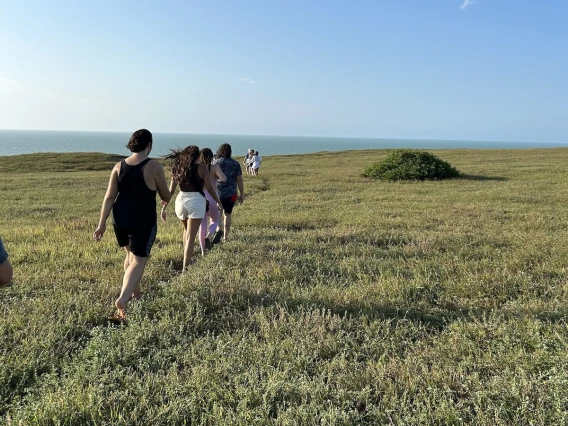
Study Abroad students hiking to Pedra Furada in Brazil's Jericoacoara National Park.
The University of Arizona has been awarded a four-year federal grant to establish a Portuguese Flagship Program, with new resources available to advance students’ language skills and career opportunities, including a capstone year in Brazil.
The $1.2 million grant is part of the Language Flagship programs, a public/private partnership sponsored by the National Security Education Program of the Department of Defense and administered by the Institute of International Education. The program seeks to graduate students with professional-level proficiency in a language critical to U.S. national security, including Portuguese.
The program expects to enroll about 15 to 20 students annually, with the Flagship grant providing a myriad of resources to students studying Portuguese, including one-to-one advising and tutoring, career counseling with local professionals, summer study abroad opportunities in Salvador, the capital of Bahia in northeastern Brazil, and a capstone year in Brazil for additional classes and internships. After successfully meeting the program benchmarks, students receive a Flagship certificate.
“That’s what makes the difference on the job market. The students will have a document from the federal government that says they’re professionally proficient in Portuguese,” said Kátia Bezerra, Professor in the Department of Spanish and Portuguese and program director.
“Portuguese Flagship students will not only master the language and deepen their cultural insights but have the opportunity to immerse themselves in a Brazilian-language environment during the transformative capstone experience. In an increasingly competitive global economy, these skills are a must and often result in higher salaries.”
The U of A is one of two institutions awarded a Portuguese Flagship grant, joining the University of Georgia, and was also awarded a renewal grant for Arabic, making it one of four universities nationally with at least two flagship programs. In total, the 2024-2028 cycle awarded 19 grants to Language Flagship programs in six languages: Arabic, Chinese, Korean, Persian, Portuguese and Russian.
The U of A has nearly 50-year history teaching Portuguese, with a multidisciplinary curriculum that has attracted 1,551 students into Portuguese language and culture courses over the last five years. The basic language track has options for students with or without Spanish language skills, but the majority of students enrolled in Portuguese also speak Spanish as their first, heritage, or second language. With the U of A’s designation as a Hispanic Serving Institution, that pathway for Spanish-speaking students to add or transition to Portuguese is key, Bezerra said.
“The Portuguese program offers a strong foundation upon which Flagship students can thrive and succeed. It is a well-established, student-centered, outcomes-based, proficiency-focused, and innovation-friendly program with a track record of producing culturally knowledgeable and linguistically proficient U.S. citizens,” she said.
The faculty regularly update the Portuguese curriculum with new courses that extend beyond language and linguistics to cover literature, cultural studies, environment and business. The Flagship grant will also enable expansion of the Portuguese program. Antonio José Bacelar da Silva, Associate Professor of Brazil Studies and Linguistic Anthropology, is associate director of the Flagship program.
“The immersive and transdisciplinary Portuguese program at the University of Arizona shows a tremendous capacity to excite, educate and professionalize a wide range of students interested in Portuguese language and culture,” Bezerra said. “The Flagship Program will quickly prepare students linguistically and culturally, thus making them more agile, thoughtful and committed citizens of the world.”
With a population of more than 200 million, Brazil is the world’s seventh most populous country, while also being among the most ethnically diverse nations. Annual trade between the United States and Brazil, the second most populous country in the Americas, tops $120 billion.
“This investment can result in a relatively rapid and measurable increase in the national pool of proficient Portuguese-speaking U.S. citizens,” Bezerra said. “Expanding the number of opportunities for students to engage in speaking, listening, reading and writing in Portuguese, both inside and outside the classroom, is crucial for achieving this goal.”

